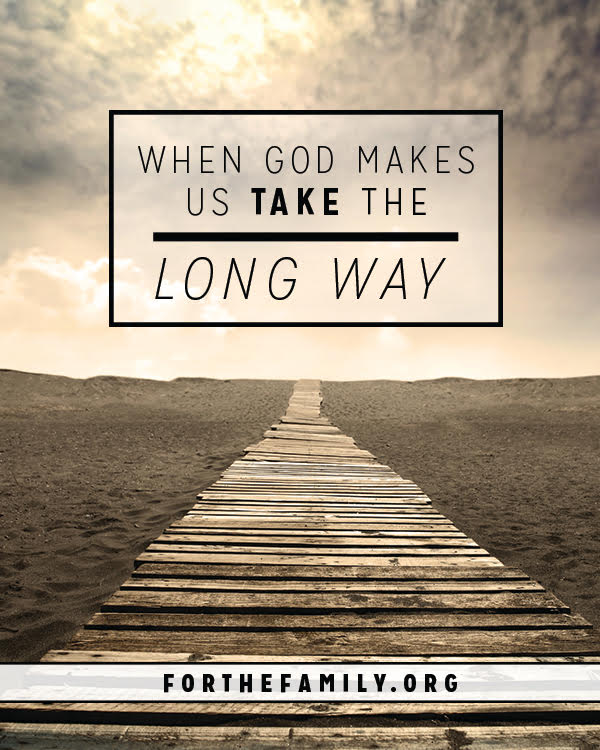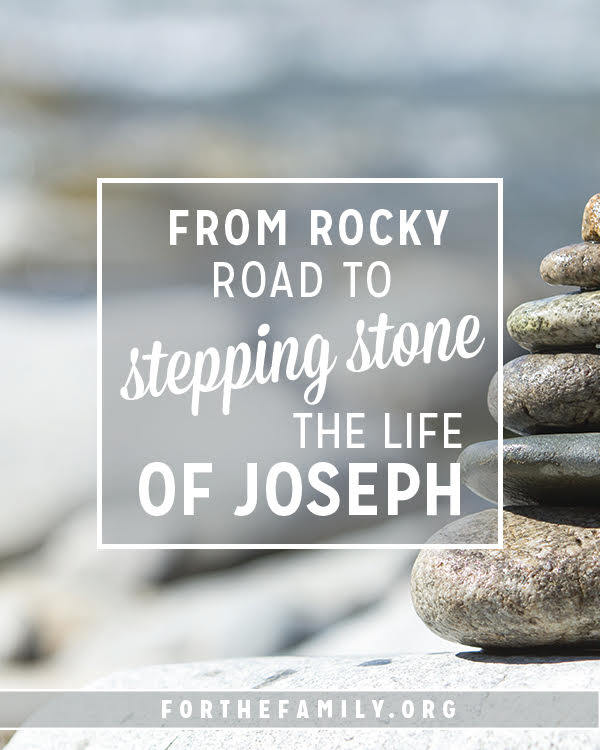When God Makes Us Take the Long Way
 Maybe it’s the hurry-up, can’t-we-do-this-faster, surely-there’s-a-short-cut Southern California girl in me, but when I look at a map showing the Israelites’ route from Egypt to the Promised Land, I’m like, really? Why go south all the way to the far end of the Sinai Peninsula, when they could have simply headed east for a nice, straight shot. A much easier, quicker, shorter, more convenient way. Done.
Maybe it’s the hurry-up, can’t-we-do-this-faster, surely-there’s-a-short-cut Southern California girl in me, but when I look at a map showing the Israelites’ route from Egypt to the Promised Land, I’m like, really? Why go south all the way to the far end of the Sinai Peninsula, when they could have simply headed east for a nice, straight shot. A much easier, quicker, shorter, more convenient way. Done.
As believers, sometimes a good place to start is remembering what we don’t believe. We do not believe that our gracious God would send His children on a wild goose chase, or that He would lead them astray just for fun. Neither do we believe that our God is capable of making mistakes. So, looking at the facts, that God had the Israelites’ best interest at heart and that He loved them as a father loves his own child, why would He choose this more time-consuming, more difficult route? Why the long way around?
The long way protected the Israelites from unknown battles. The Jewish people had no idea what they would face, no clue what they would find around the next corner, mountain or acacia tree. Seeing what lay ahead, and how His children would have responded, God wisely led the Israelites south, away from war zones and down a more peaceful path. In reality, their puzzling path was merely the protective hand of a loving Father. When Pharaoh let the people go, God did not lead them on the road through the Philistine country, though that was shorter. For God said, “If they face war, they might change their minds and return to Egypt.” (Exodus 13:17, NIV)
The long way showcased God’s miracles. If the Israelites were never hungry in the wilderness, there wouldn’t have been a miraculous food created from the morning dew. If they had plenty to drink on their journey, no one would have witnessed water gushing from a rock. If they hadn’t felt a little loss, the fire to lead by night and the daytime cloud signaling to stay wouldn’t have been necessary. God had too much strength and power to display in the desert, and too much faith to grow in the hearts of His people, to let them take the quicker road. As in the days when you came out of Egypt, I will show you my wonders. (Micah 7:15, NIV)
The long way was an opportunity for teaching. Unchartered territory has a funny way of getting our attention. When the Israelites realized that their journey was going to be a long and difficult road, first they grumbled, then they listened. There were consequences for their bouts of doubts, but their complete dependence on the Lord eventually gave them a sensitive ear to His voice. He spoke to His children on a regular basis, instructing them about His character, His holiness, His sovereignty, and His trustworthiness. “The secret things belong to the Lord, but the things revealed belong to us and our children forever.” (Deuteronomy 29:29, NIV)
Thousands of years after God’s chosen nation entered the Promised Land, we see what God wanted to accomplish through the longer way. And it’s clear that He loved His children too much to let them miss it. So today, what is your Promised Land? What is that dream or goal or place or season or job or situation you’d like to find yourself? Maybe it’s finding a soulmate. Or becoming a wife. Possibly getting pregnant or growing your family through adoption. Or a particular vocation or industry in which to work, a part of the world to live, a talent or hobby you want God to use, a ministry to start.
You’ve been walking a while now and you’re anxious to arrive, but God is making you take the long way around. Instead of the quick, comfortable, easy road, He has set you on the seemingly out-of-the-way way. Maybe it’s months, years, or even decades to get you where you’re going, to show you what couldn’t be discovered by taking the short cut.
And He loves you too much to let you miss it.
Blessings,
Kathryn O’Brien







More often than not it is not God, but we who choose the “long way” because we choose our own interests, including our interest in Paradise rather than the vulnerability to God our Savior Jesus displays at every moment of His existence. When He faced the immense trials of His life, He did not embrace Heaven. He embraced absolute vulnerability and obedience to the wishes of the Father. Our sonship with respect to the Father is not only rooted in that of Jesus, but is precisely the same sonship as His. Can we expect then to enter Heaven taking a disposition other than that of our Savior with respect to our Father? The short way to our destiny with Him may not be the easy or comfortable way but it is utterly filled with the consolation of the presence of our God because it is He who is resident within us, possessing us. It is God Himself who enables the shortest route to our destiny of life with Him and the vision of Him which in turn enables genuine obedience to Him, and not what we merely think or hope is obedience. If we truly wish to eliminate the guesswork about our true path to Heaven we will express to Him and embrace our consummate vulnerability to God, determining to eliminate “yeah but” as our preferred preface of qualification to every discussion concerning what needs to become our unqualified personal surrender to Him.
I love this. God took me through years of infertility, and because of that, I know it has made me a mom with a heart of gratitude when it comes to my daughter. I started to learn to wait on Him, and lean on Him. Just when I thought the road was finally smoothing out, my husband of 10 years walked out on us. That was a year ago, almost exactly. While I get tired and discouraged sometimes waiting to see what God is going to do with my husband (and with me), I wouldn’t trade this experience for the world.
It’s true. When you are well fed, you don’t need the Lord’s provision. When you have never been cold, a warm blanket doesn’t seem like anything special. When your god is already in front of your eyes, you never raise them to the real Yahweh with any sincerity (I can now admit that I made an idol of my husband). If I ask for food, God will not give me a stone, but I have to be in need enough to ask.